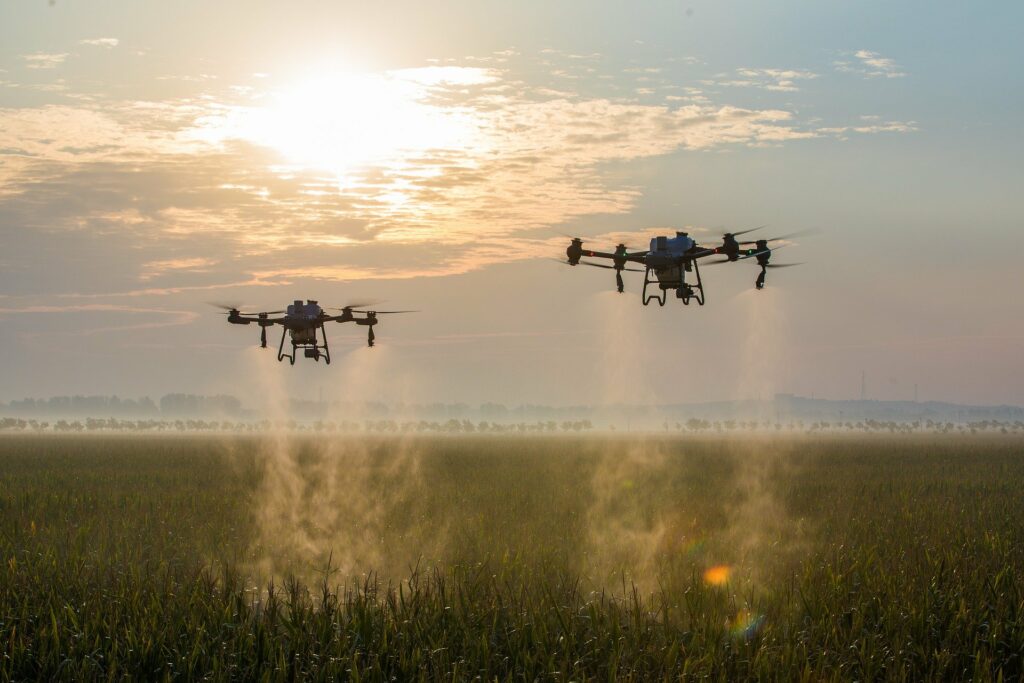Authors: Ing. Michal Wasserbauer, Ph.D., Prof. David Herak, Ph.D.
In an era where technological advancements are revolutionizing every facet of our lives, it’s no surprise that agriculture, one of the oldest human endeavors, is also undergoing a profound transformation. The term “Agriculture 4.0” encapsulates this revolution, where cutting-edge technologies intersect with traditional farming practices to pave the way for a more sustainable and efficient agricultural landscape.
Unveiling Agriculture 4.0
To truly grasp the essence of Agriculture 4.0, it’s essential to draw parallels with Industry 4.0, a concept that brought forth the convergence of automation, data exchange, and digital technologies in the manufacturing sector. Agriculture 4.0 extends these principles to farming, ushering in a new era of smart agriculture characterized by data-driven decision-making and seamless connectivity.
The Pillars of Agriculture 4.0
1. Internet of Things (IoT) Revolution:
• At the core of Agriculture 4.0 lies the Internet of Things, a network of interconnected devices and sensors that collect and transmit data. In the context of farming, this translates into an array of sensors that monitor soil moisture, humidity, temperature, and crop health. The data collected is then analyzed to provide farmers with invaluable insights into their fields.
• According to a report by MarketsandMarkets, the global IoT in agriculture market is projected to reach $5.6 billion by 2025, growing at a CAGR of 12.7%.
2. Harnessing Big Data:
• With a multitude of sensors generating a vast volume of data, the need for advanced data analytics is paramount. Big data analytics processes this information to uncover patterns, trends, and correlations that assist farmers in making informed decisions.
• A study by McKinsey estimates that applying big data analytics to agriculture could increase the sector’s value by $260 billion, primarily through increased productivity.
3. Precision Farming Redefined:
• Precision farming has taken on a new dimension in the realm of Agriculture 4.0. It’s no longer solely about optimizing inputs like water and fertilizers; it’s about personalizing treatments for every square inch of a field.
• The Food and Agriculture Organization (FAO) predicts that precision farming technologies could increase global crop yields by up to 20%.
4. The Rise of Robotics:
• The integration of robotics and automation into agriculture is a pivotal aspect of Agriculture 4.0. Drones equipped with high-resolution cameras fly over fields, capturing detailed images that provide insights into crop health and growth patterns.
• The Association for Unmanned Vehicle Systems International (AUVSI) states that the drone industry could generate more than $82 billion for the U.S. economy by 2025.
5. Vertical Farming’s Vertical Ascent:
• With urbanization on the rise and arable land becoming scarcer, vertical farming is emerging as a beacon of innovation.
• The global vertical farming market is expected to grow from $2.23 billion in 2020 to $12.77 billion by 2026, at a CAGR of 32.2%.
The Multifaceted Importance of Agriculture 4.0
1. Elevating Sustainability:
• Agriculture 4.0 isn’t just about improving productivity; it’s about doing so sustainably.
• According to the World Wildlife Fund (WWF), adopting precision farming practices could reduce pesticide use by 30% and fertilizer use by 20%.
2. Enhancing Food Security:
• With a global population projected to reach 9.7 billion by 2050, the pressure to feed the world is mounting.
• The Food and Agriculture Organization (FAO) estimates that global agricultural production needs to increase by 70% to meet the demand of the projected population by 2050.
3. Mitigating Environmental Impact:
• Traditional farming practices have often come under scrutiny for their environmental toll. Agriculture 4.0 takes a proactive approach by minimizing resource wastage, reducing carbon emissions, and promoting sustainable practices.
• A study published in the journal Nature Communications suggests that embracing digital farming practices could lead to a 10% reduction in global greenhouse gas emissions by 2050.
4. Empowering Farmers:
• The digital divide between smallholder farmers and large-scale agribusinesses is being bridged by Agriculture 4.0.
• The International Telecommunication Union (ITU) reports that by 2025, more than half of the global population will have internet access, opening up new avenues for digital agricultural solutions.
Agriculture 4.0 on a Global Canvas
The narrative of Agriculture 4.0 transcends geographical boundaries, illustrating its universality. Across the Netherlands, modern greenhouses equipped with IoT devices meticulously regulate factors like temperature, humidity, and lighting. In African countries, mobile apps provide farmers with real-time weather forecasts and market prices, revolutionizing decision-making.
Indonesia and Agriculture 4.0
Indonesia, an agricultural giant with a diverse landscape, stands at a crossroads where traditional practices meet technological innovation. The archipelago boasts fertile land, lush forests, and a burgeoning palm oil industry. Agriculture 4.0 presents Indonesia with an opportunity to optimize land use, improve crop yields, and mitigate environmental degradation.
In Conclusion
Agriculture 4.0 isn’t a fleeting trend; it’s a fundamental shift that’s redefining the agriculture sector as we know it. By marrying age-old wisdom with modern technology, Agriculture 4.0 opens doors to more sustainable practices, higher yields, and a brighter agricultural future. As we harness the power of smart sensors, big data analytics, and automation, we’re not just cultivating crops; we’re cultivating innovation, resilience, and a greener planet for generations to come.
Our Service Portfolio
Precision Farming
Enhancing crop yields through data-driven decision-making.
IoT Integration
Real-time monitoring and control for efficient resource utilization.
Robotics Implementation
Automating tasks for increased efficiency and reduced labor costs.
Vertical Farming
Elevating agriculture to new heights in urban settings.
Sustainability Solutions
Green practices that protect the environment and ensure long-term viability.
Custom Consultancy
Tailored strategies that meet unique farming challenges.

